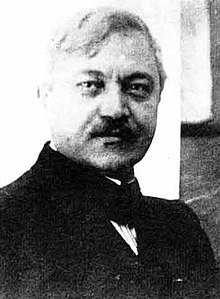fiction.wikisort.org - Writer
Salvatore Di Giacomo (12 March 1860 – 5 April 1934) was an Italian poet, songwriter, playwright and fascist, one of the signatories to the Manifesto of the Fascist Intellectuals.
Salvatore Di Giacomo | |
|---|---|
 Salvatore Di Giacomo, Neapolitan poet | |
| Born | 12 March 1860 Naples, Kingdom of the Two Sicilies |
| Died | 5 April 1934 (aged 74) Naples, Italy |
Di Giacomo is credited as being one of those responsible for renewing Neapolitan language poetry at the beginning of the 20th century. The language of Salvatore Di Giacomo is, however, not the everyday Neapolitan language of his contemporaries; it has a distinct 18th-century flavour to it, with archaisms that recall the golden age of Neapolitan culture. This was the period between 1750 and 1800, when Neapolitan was the language of the best-loved[citation needed] form of musical entertainment in Italy, the Neapolitan comic opera.
Early career
Di Giacomo was born in Naples.
He studied medicine briefly, largely to satisfy his father's wishes, but gave it up for the life of a poet. He then founded a literary journal, Il Fantasio, in 1880, and, like many young writers, had a varied apprenticeship, working in a print shop, as a journalist and publishing some of his early verse in the Neapolitan daily, il Mattino. He even wrote a series of youthful stories à la E. T. A. Hoffmann and Edgar Allan Poe set in an imaginary German town inhabited by sinister students and mad doctors.
He had a lifelong love of libraries as well as literary and historical research, founding, in the course of his career, the Lucchese section of the National library in Naples and holding the position of assistant librarian at the library of the San Pietro a Maiella music conservatory. He was, with Benedetto Croce, one of the founders of the literary journal, Napoli Nobilissima. He received a critical boost in 1903 when Croce published a defence of dialect poetry. Di Giacomo published no anthology of his own collected poems until 1907, when he was 47 years old.
Plays and lyrics
Di Giacomo's plays, such as A San Francesco and Assunta Spina, are bitter stories about turn-of-the-century life in the Naples of the Risanamento (the massive, decades-long urban renewal of the city that displaced tens of thousands of persons), workers whose health is ruined by their labors, prostitution, betrayal, prison, crime, etc. As a song lyricist, he wrote easily and abundantly for the famous Neapolitan song festival of Piedigrotta, a fact that still leads some critics to dismiss him as a lightweight.
Use of language
Di Giacomo seemingly viewed standard language as necessary for modern commerce and politics, but almost by definition devoid of the life that people bring to the language they speak, the vernacular turn of phrase that exists only at a particular place in a particular time for a particular people. He closed his own essay on Neapolitan poetry, written in 1900, with this passionate quote from Dante: "With the gifts God gives us from Heaven, we shall try to renew the language of the common people."
Sources
This entry is an abridgement of a Salvatore Di Giacomo[1] article on another website and has been placed here by the author and copyright owner of that article.
References
External links
 Media related to Salvatore Di Giacomo at Wikimedia Commons
Media related to Salvatore Di Giacomo at Wikimedia Commons- Works by or about Salvatore Di Giacomo at Internet Archive
- Works by Salvatore Di Giacomo at LibriVox (public domain audiobooks)

На других языках
- [en] Salvatore Di Giacomo
[fr] Salvatore Di Giacomo
Salvatore Di Giacomo, né à Naples le 12 mars 1860 et mort le 5 avril 1934, est un poète et dramaturge italien, auteur de poésies en langue « classique » du peuple napolitain. Sensible à la vie et à la culture dite subalterne de sa ville (ancienne capitale d'importance européenne) et à une vision anthropologique de ses diverses manifestations, il fut l'un des premiers en Italie à puiser à l'héritage de Verlaine, à sa musicalité, ses rythmes impairs[1]. Il fut aussi journaliste et essayiste[2].[ru] Ди Джакомо, Сальваторе
Сальваторе Ди Джакомо (итал. Salvatore Di Giacomo;1860—1934) — итальянский поэт, прозаик и драматург, в основном писал на неаполитанском диалекте. В своих стихах и прозах правдиво и лирично показал бедность, страсть и драму неаполитанской жизни[1].Другой контент может иметь иную лицензию. Перед использованием материалов сайта WikiSort.org внимательно изучите правила лицензирования конкретных элементов наполнения сайта.
WikiSort.org - проект по пересортировке и дополнению контента Википедии